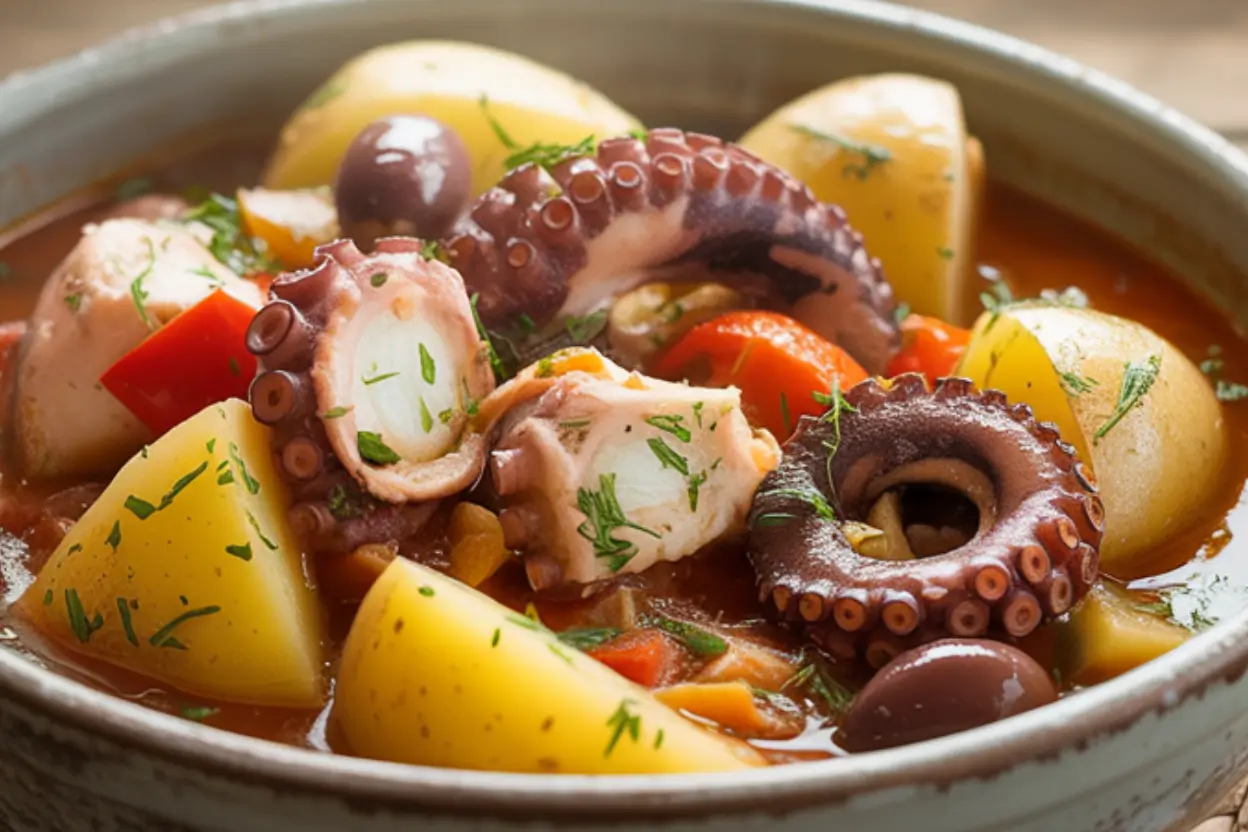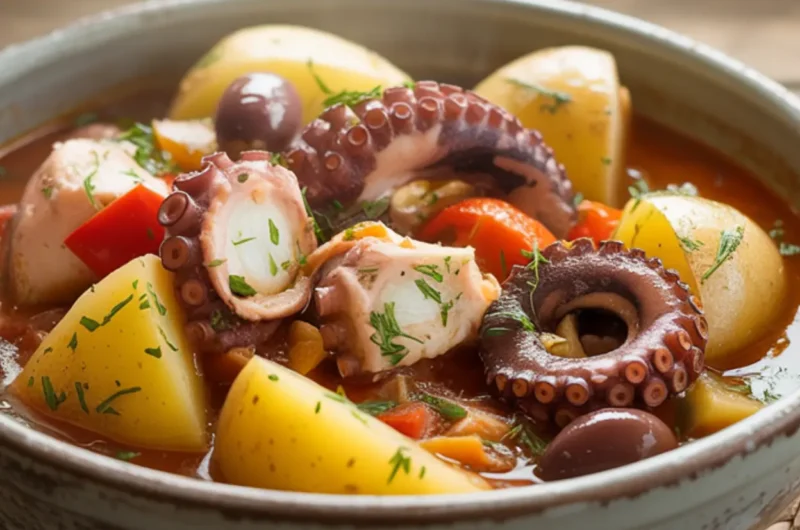Greek Octopus Stew With Potatoes: 5 Secrets to Perfect Flavor
Table of Contents
There’s something magical about Mediterranean cuisine that speaks to my soul, and Greek octopus stew with potatoes is one of those dishes that exemplifies why this cuisine has captured hearts worldwide. The tender octopus, hearty potatoes, and aromatic herbs come together in a symphony of flavors that transports you straight to a seaside taverna in Greece. After years of perfecting this recipe in my home kitchen, I’m excited to share my version of this classic dish, complete with the five secrets that will elevate your Greek octopus stew to restaurant-quality perfection.
Thank you for reading this post, don't forget to subscribe!How to Make Greek Octopus Stew With Potatoes
Quick Overview
This Greek octopus stew with potatoes combines the rich, tender texture of slow-cooked octopus with hearty potatoes in a fragrant tomato-based sauce infused with Mediterranean herbs and spices. What makes this recipe truly special is the depth of flavor achieved through a few simple techniques and an abundance of fresh ingredients. The octopus becomes incredibly tender while the potatoes absorb all the wonderful flavors of the broth. Though it requires a bit of patience, the actual hands-on preparation time is only about 30 minutes, with a total cooking time of approximately 2 hours. Trust me—this dish is well worth the wait and will fill your kitchen with enticing aromas that signal something extraordinary is happening.
The Ingredients I Use to Bring My Greek Octopus Stew With Potatoes to Life
For the Octopus:
- 2-3 pounds fresh or frozen octopus, cleaned
- 2 tablespoons extra virgin olive oil
- 1 large onion, finely chopped
- 4 garlic cloves, minced
- 2 bay leaves
- 1 teaspoon dried oregano
- 1/2 teaspoon dried thyme
- 1/4 teaspoon red pepper flakes (adjust to taste)
- 1 cinnamon stick
- 3 tablespoons tomato paste
- 1 can (14.5 oz) diced tomatoes
- 1 cup fish stock (or vegetable stock)
- 1/2 cup water
- 2 tablespoons red wine vinegar
- 1/4 cup fresh lemon juice
- 2 pounds of Yukon Gold potatoes, peeled and chopped into 2-inch pieces.
- 1 red bell pepper, diced
- 1/2 cup Kalamata olives, pitted
- 1/4 cup fresh parsley, chopped
- 2 tablespoons fresh dill, chopped
- Salt and freshly ground black pepper to taste
Step-by-Step Instructions
- Prepare the octopus: If using frozen octopus, thaw it completely. Rinse the octopus thoroughly under cold water, removing any remaining debris from the suckers. Pat dry with paper towels.
- Tenderize the octopus: Bring a large pot of water to a boil (don’t add salt). Holding the octopus by the head, dip the tentacles into the boiling water, then lift out. Repeat this process 3 times. This helps the tentacles curl attractively. Then, submerge the entire octopus in the boiling water for 30 seconds, remove it, and set it aside.
- Begin the stew base: In a large Dutch oven or heavy-bottomed pot, heat the olive oil over medium heat. Add the diced onion and cook for about 5 minutes, or until it becomes translucent.
- Build the flavor foundation: Add the minced garlic, bay leaves, oregano, thyme, red pepper flakes, and cinnamon stick to the pot. Cook for another 2 minutes until fragrant.
- Create the sauce: Stir in the tomato paste and cook for 1 minute, then add the diced tomatoes with their juice. Cook for 5 minutes, stirring occasionally.
- Add the liquids: Pour in the fish stock, water, and red wine vinegar. Bring the mixture to a gentle simmer.
- Cook the octopus: Cut the octopus into 2-inch pieces and add to the pot. Reduce heat to low, cover, and simmer for about 60 minutes, or until the octopus begins to become tender. Check occasionally and add a little more water if needed.
- Add the potatoes: When the octopus begins to turn tender, add the potato chunks and diced red bell pepper to the pot. Cover and continue simmering for another 30–45 minutes, or until both the octopus and potatoes are fully tender. The octopus should be easily pierced with a fork.
- Finish the stew: About 10 minutes before the cooking is complete, add the Kalamata olives and lemon juice. Stir gently to combine.
- Season and garnish: Take the pot off the heat and discard the bay leaves and cinnamon stick. Taste the dish and adjust the seasoning with salt and pepper if necessary. Stir in the chopped fresh parsley and dill.
- Allow to rest: Let the stew rest for 10-15 minutes before serving. This allows the flavors to meld together and the stew to thicken slightly.
What to Serve Greek Octopus Stew With Potatoes With
This hearty Greek octopus stew with potatoes is a complete meal on its own, but a few complementary sides can enhance the dining experience:
- Fresh Greek Salad: A simple combination of crisp cucumbers, juicy tomatoes, red onions, feta cheese, and Kalamata olives dressed with olive oil and lemon juice provides a refreshing contrast to the rich stew.
- Crusty Bread: A loaf of rustic bread, lightly toasted and brushed with olive oil, is perfect for soaking up the flavorful broth.
- Tzatziki Sauce: This cooling yogurt and cucumber dip adds a creamy dimension that complements the hearty stew beautifully.
- Simple Steamed Greens: Lightly steamed or sautéed greens like spinach or dandelion greens dressed with lemon juice make a healthy, bitter counterpoint to the rich stew.
- Greek White Wine: A crisp, mineral-forward white wine like Assyrtiko from Santorini pairs wonderfully with this dish.

Top Tips for Perfecting Greek Octopus Stew With Potatoes
- Secret #1 – Properly prepare your octopus: Many cooks are intimidated by octopus, but it’s actually quite simple to prepare. The key is proper tenderizing. Some traditional Greek cooks pound the octopus or slam it against rocks, but the dipping method followed by a brief boil works well. Never salt the water when pre-boiling octopus, as it can make it tough.
- Secret #2 – Low and slow is the way to go: Patience is crucial when cooking octopus. A slow simmer allows the collagen to break down properly, resulting in tender meat rather than rubbery. Never rush this process by boiling vigorously.
- Secret #3 – Choose the right potatoes: Yukon Gold potatoes hold their shape well during the long cooking process while still absorbing the flavors of the broth. Avoid waxy potatoes that won’t absorb the sauce or starchy potatoes that might fall apart completely.
- Secret #4 – Layer your aromatics: Building flavor in stages is essential. Cook each aromatic ingredient (onions, then garlic, then herbs and spices) for the proper amount of time to release its essential oils before adding the next component.
- Secret #5 – Add acid at the right time: The vinegar and lemon juice are crucial for balancing the dish, but add them at different stages. The vinegar early on helps tenderize the octopus, while the fresh lemon juice added toward the end preserves its bright flavor.
Storing and Reheating Tips
Like many stews, Greek octopus stew with potatoes actually improves with time as the flavors continue to develop. Here’s how to make the most of any leftovers:
Refrigeration: Let the stew cool completely before transferring it to airtight containers. It can be stored in the refrigerator for up to 3 days. During this time, the flavors will deepen, making it even more flavorful the next day.
Freezing: This stew freezes exceptionally well. Divide it into freezer-safe containers, leaving a bit of space at the top for expansion. It will keep in the freezer for up to 3 months. For best results, thaw it overnight in the refrigerator before reheating.
Reheating: For the best texture, reheat the stew gently on the stovetop over medium-low heat until just heated through. Avoid vigorous boiling, which can make the octopus tough. Add a splash of water or fish stock if the stew has thickened too much during storage.
Refreshing: When serving reheated stew, a sprinkle of fresh herbs and a squeeze of lemon juice just before serving will brighten the flavors and make it taste freshly made.
Greek octopus stew with potatoes is more than just a meal—it’s a celebration of Mediterranean culinary traditions. With these secrets and techniques, you’ll create a dish that brings the warmth, flavors, and comfort of a Greek taverna right to your own dining table. Kali orexi! (Bon appétit!)
Greek Octopus Stew With Potatoes: 5 Secrets to Perfect Flavor
Cuisine: Greek / MediterraneanDifficulty: Moderate4-6
servings25
minutes1
hour30
minutes400-450
kcalThis hearty and aromatic Greek Octopus Stew with Potatoes is a comforting Mediterranean dish simmered in a rich tomato-based broth with warm spices, tender octopus, and creamy Yukon Gold potatoes. Accented with olives, red bell pepper, and fresh herbs, it’s a beautiful blend of bold and subtle flavors that evoke traditional Greek coastal cooking.
Ingredients
2-3 pounds fresh or frozen octopus, cleaned
2 tablespoons extra virgin olive oil
1 large onion, finely chopped
4 garlic cloves, minced
2 bay leaves
1 teaspoon dried oregano
1/2 teaspoon dried thyme
1/4 teaspoon red pepper flakes (adjust to taste)
1 cinnamon stick
3 tablespoons tomato paste
1 can (14.5 oz) diced tomatoes
1 cup fish stock (or vegetable stock)
1/2 cup water
2 tablespoons red wine vinegar
1/4 cup fresh lemon juice
2 pounds of Yukon Gold potatoes, peeled and chopped into 2-inch pieces.
1 red bell pepper, diced
1/2 cup Kalamata olives, pitted
1/4 cup fresh parsley, chopped
2 tablespoons fresh dill, chopped
Salt and freshly ground black pepper to taste
Instructions
- Prepare and Tenderize the Octopus
Thaw frozen octopus completely, rinse thoroughly, and pat dry. Bring a pot of water to a boil. Holding the octopus by the head, dip the tentacles in and out of the water 3 times to curl them. Submerge the entire octopus for 30 seconds, then remove and set aside. - Sauté Aromatics and Build Flavor
In a large pot or Dutch oven, heat olive oil over medium heat. Sauté chopped onion until translucent. Add garlic, bay leaves, oregano, thyme, red pepper flakes, and cinnamon stick. Cook for 2 minutes until fragrant, then stir in tomato paste and cook for 1 minute. Add diced tomatoes and simmer for 5 minutes. - Add Liquids and Cook the Octopus
Pour in the fish stock, water, and red wine vinegar. Bring to a simmer. Cut the octopus into 2-inch pieces and add to the pot. Cover and simmer on low heat for about 60 minutes, until the octopus starts becoming tender. - Add Vegetables and Simmer
Add the potatoes and diced red bell pepper to the pot. Cover and simmer for 30–45 more minutes, until the octopus and potatoes are fully tender. In the last 10 minutes, stir in Kalamata olives and lemon juice. - Finish and Serve
Remove bay leaves and cinnamon stick. Season with salt and pepper to taste. Stir in fresh parsley and dill. Let the stew rest for 10–15 minutes before serving to allow flavors to meld.
Notes
- Octopus is a staple in coastal Greek cuisine, prized for its tender texture when slow-cooked. The combination of cinnamon and tomato is uniquely Greek, adding depth and warmth to the stew. The addition of fresh lemon juice, dill, and olives brightens the dish, balancing the richness of the broth. This dish is traditionally served with crusty bread or on its own as a complete meal.




